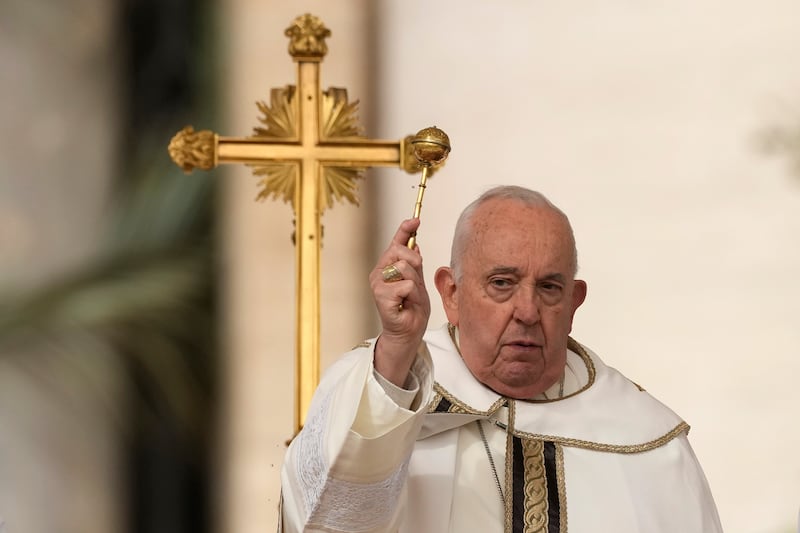Pat Buckley, who died last month at the age of 72, was by any standards among the most remarkable figures to emerge from within the Catholic Church in Ireland in living memory.
He was undoubtedly an individual of rare determination, and his admirers believed at one stage that he would develop into a key reforming influence either inside or on the fringes of Catholicism, but his ministry instead took him in unexpected and frequently negative directions which meant that his reputation was severely damaged long before his passing.
After growing up as the eldest in a family of 17 children, in Tullamore, Co Offaly, he was ordained as a priest in 1976 and received his first appointment as a curate at St Peter’s Cathedral in the Divis area of west Belfast.
He made an immediate impact, speaking out on a range of issues, but his relationship with his superiors in the Diocese of Down and Connor began to deteriorate sharply for a number of reasons, and he was transferred firstly to the parish of Upper Mourne in Kilkeel, Co Down in 1983, and then to Larne, Co Antrim, the following year.
He Buckley was eventually suspended from the priesthood in 1986, before being dramatically elected as an independent member of Larne Borough Council in 1989, against all Church regulations.
I got to know him well, as the then local government correspondent of The Belfast Telegraph during the four-year term of office before he lost his seat, but came to the conclusion that his views, while always colourful, were factually unreliable and tended to be self-serving.
He announced in 1998 that he had become an independent bishop, although the Church described the appointment as illicit. He was very sensitive about his title, but there was no consensus over what he should be called; for the purposes of this column I’ll refer to him as Rev Buckley.
Concerns began to grow steadily about both the nature of the ceremonies at which Rev Buckley officiated and the level of donations he accepted as a result.
A vivid insight into his activities emerged shortly afterwards when a respected philanthropic couple took High Court action over Rev Buckley’s failure to repay loans stretching into six figures, in connection with his attempts to acquire ownership of a disused Church of Ireland church in Omeath, Co Louth.
I got to know Pat Buckley well, as the then local government correspondent of The Belfast Telegraph during the four-year term of office before he lost his seat, but came to the conclusion that his views, while always colourful, were factually unreliable and tended to be self-serving.
Legal papers revealed in 2001, which he did not dispute, indicated that he was provided with credit cards on which he ran up bills of over £30,000, including a sum of £6,000 for elaborate clerical robes.
Rev Buckley had previously accused the Catholic Church of extravagance, and being out of touch with ordinary people, but he shrugged off all the clear indications of double standards set out in a revealing BBC Spotlight documentary at the time.
However, he found himself under much greater pressure in 2011 when a carefully researched Irish News report by Maeve Connolly disclosed that he was under formal investigation for prolonged financial involvement in sham marriages.
Rev Buckley as ever came out fighting and took an official case to the then media regulator, the Press Complaints Commission, insisting that our coverage was entirely fabricated and he had only been assisting the authorities with their inquiries.
The PCC found itself in the unusual position of having to decide whether either a daily newspaper or a person presenting himself as a bishop had behaved in a completely mendacious way, and, after considering his statements and a dossier I provided, publicly ruled in favour of The Irish News on every point.
Before long, Rev Buckley was appearing in the dock at Belfast Crown Court, pleading guilty to all the charges which he had previously robustly denied, linked to the payments he received for solemnising sham marriages, mainly between Portuguese women and Bangladeshi men.
The judge said he was an essential cog in the criminal conspiracy and handed down a three and a half year jail sentence, which was suspended after details were provided of the defendant’s HIV condition.
Rev Buckley had understandably attracted widespread support when he first spoke openly about his sexuality, but he went on to pursue what could only be regarded as a vindictive online campaign against those he regarded – often on the most dubious of evidence – as gay priests, as well as other perceived enemies.

The way in which he regularly named and ran photographs of his many targets caused enormous hurt, but he maintained that he would respond to any defamation cases by claiming that he had no assets, a questionable assertion which still dissuaded many potential plaintiffs.
When he died, all access to his notorious blog, which for many years he updated daily, abruptly ended. The website of the Oratory Society, which he founded in 1986, is also no longer operational and the indications are that ownership of the former parochial house in Larne, where it was based and to which he had claimed squatter’s rights, will be returned to the Diocese of Down and Connor.
The fate of the initiatives to which he devoted much of his adult life effectively leaves him without a legacy, an outcome which would not have pleased a person with such a strong sense of his own importance.








